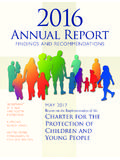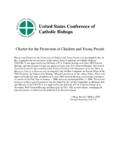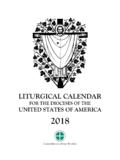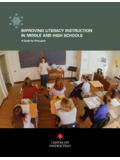Transcription of Adolescent atechesis: A atechesis That ngages Youth for ...
1 Adolescent Catechesis: A Catechesis That Engages Youth for Discipleship by Fr. John J. Serio, SDB Principal, Don Bosco Cristo Rey High School, Takoma Park, Maryland One summer night when I was a young priest, I went with two of my younger brothers to have dinner with our pious grandmother and our aunt. During the dinner, my grandmother said to my college-attending brother, I hope you will go to Confession before you go back to school. We were somewhat surprised by the forthright nature of her statement and just as surprised by my brother s forthright response, Confession! I haven t been to Confession in years. It was my grandmother s turn to be taken aback. But she was not going to be silenced by his statement, so she responded, Don t you need God s forgiveness in your life? To which my other brother quickly retorted, God! Who needs God? My grandmother and aunt both looked at me as if to say, You re the priest.
2 Do something about it. Needless to say, the rest of the evening was full of loud discussion and more than a small amount of discomfort, at least for me. To be sure, we grew up in a family where faith played a major part in the lives of our parents, and they instilled that faith in us. It was preached and it was practiced. That faith was communicated and taught to us in word and deed. I also know that my brothers religious formation program in high school was neither engaging nor complete. By the time my brother went to college, his grasp of the practice of the faith had loosened considerably. Who needs God? The question may not be asked that baldly, but it is a question that confronts many adolescents, if not directly, at least indirectly in several daily situations. While many young Catholics state that they believe in God and in Jesus, their beliefs and their lifestyles may not always match the beliefs and practices of the Church.
3 How do we help young people come to a knowledge of and relationship with Jesus Christ? How do we help teens and young adults come to know, love, and serve God? How do we help our young people see that they are called, from the day of their Baptism, to follow the Lord Jesus as his disciple? These are not new questions, and they have often wracked the imaginations of Catholic catechists as they deal with young people during a 2 period of great personal questioning and growth in their lives. At least since the mid-1960s, an era of great social and religious changes, this has been a serious issue. The years after Vatican II saw enormous upheaval in every area of life, not only in the Church, but also in society. New ways of educating, communicating, and seeing the world and reality around us sprang up in ever-newer configurations and in almost every place around the world.
4 Over the past ten years, in particular, the issue of Adolescent faith has taken on greater import. The research carried out by the National Study of Youth and Religion and Christian Smith s resulting seminal work, Soul Searching, have brought this issue to the forefront not only for Catholics but for all religious bodies throughout our country. Among the many conclusions drawn by this study, a few are notable for us. Religion is a significant, but in-the-background, part of American adolescents lives. Parents are the most important influence in their children s spiritual and religious lives. Spiritual and religious understanding and concern are very weak among American teenagers. The majority of American Catholic adolescents may not be associated with a Catholic high school or a parish that has a comprehensive Youth ministry or high school catechetical formation program.
5 This study has led to further research, as well as discussion and action, in many denominations and churches as to how to deal with the question of Adolescent religious literacy and articulation. The good news is that the Catholic Church is not alone in its concern; the bad news is that we are near the bottom in rankings of religious bodies in the area of adolescents religious literacy and articulation of their faith. However, the news is not all bleak. Charlotte McCorquodale and her fellow researchers state, Rarely has a generation of young people been so interested in spirituality and religion and so open to experiences of the holy and the transcendent. This is a kairos moment the right moment for the Catholic Church and her pastoral ministry to, with, and for young people (Charlotte McCorquodale, et al., National Study of Youth and Religion: Analysis of the Population of Catholic Teenagers and Their Parents [Washington, DC: National Federation for Catholic Youth Ministry, 2004], 63).
6 Recognizing that the right moment had arrived, our two most-recent popes, Blessed John Paul II and Benedict XVI, have called for a New Evangelization to take hold in the Church. This New Evangelization is called to be new in its ardor, methods and expression (Discourse to the XIX Assembly of , Lineamenta, March 9, 1983, 3, in The New Evangelization for the Transmission of the Christian Faith, Vatican City, 2011, no. 12). It calls for boldness in proclaiming the Gospel and seeking every positive way to provide avenues for dialogue, where people s deepest expectations and their thirst for God can be discussed (Lineamenta, no. 5). It calls for a proclamation of the Gospel message and the person of Jesus not only in foreign lands, but right in our own land and neighborhoods. So, what do we do to proclaim the Good News to our adolescents? First, we, as catechists and teachers, need to be always listening and responding to the Word of God in our own lives.
7 We, as catechists and teachers, are not 3 above the need to be evangelized anew and again and more deeply ourselves. Second, we need to ask pertinent questions. Some current authors in education talk about the three R s not reading, riting, and rithmetic, but rigor, relevance, and relationships. Using this this three R s framework, what can we do as catechists and teachers of the faith? Rigor We can insist that religious formation for adolescents be intentional and complete. It is not only a matter of classroom instruction or liturgical and retreat experiences or service projects. Intentional catechesis in the New Evangelization requires all three aspects: cognitive, affective, and effective experiences. We must purposely and purposefully plan in our schools, parishes, and other places where young Catholics can be found that their formation for discipleship includes these three forms of learning.
8 An authentic discipleship includes praying, serving, and learning over the period of one s life. Relevance How does our catechesis respond to the felt and real needs of our young people? Does our catechesis help our adolescents grapple with the human and spiritual questions that they are sure to ask, even if they do not always publicize that they have such questions? It is important to dialogue with young people and to accompany them, remembering that we are not always trying to win the battle of the present but the war for As a catechist, do I build relationships with my students? Do they see me as a witness to a living faith? Am I bold in proclaiming the truth, and am I bold in engaging them in a dialogue about their lives, hopes, and aspirations? Do I help them build a relationship, as it were, with the content of faith that is presented to them in various forms?
9 What is the relationship of Adolescent catechesis to the rest of the parish or school? How do we involve parents, who themselves may have a poor comprehension of what it means to be a disciple of Jesus? Is there a connection with the larger local Church, or is Adolescent catechesis considered a side ministry for a particular set of young people and adults? These relationships are not ends in themselves. The goal of our vital ministry is to help young people come to, or deepen, a personal relationship with the Lord Jesus. Is this relationship-building what we are seeking to do, or are we content simply to present doctrine and rules without understanding the larger context of our faith? Many young people find it unfathomable that Jesus wants to have a relationship with them as individuals. We catechists are called to witness to that relationship, begun by Jesus but responded to by us.
10 We must ask ourselves these questions if we wish to make our catechetical ministries vibrant instruments of discipleship formation. These questions are not just for individuals but for the entire local Church in whatever situation it happens to be. 4 Where do we start? People are interested in assisting adolescents grow in discipleship, but they may not know how to begin or where to find assistance. The National Initiative for Adolescent Catechesis is a collaborative effort of the three associations most concerned about Adolescent faith formation (the National Catholic Educational Association, the National Federation for Catholic Youth Ministry, and the National Conference for Catechetical Leadership) and supported by the United States Conference of Catholic Bishops. This initiative has devised a process for parishes, schools, and other Catholic institutions to discern and meet the catechetical needs of their young people.

















